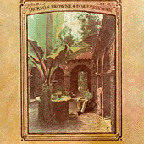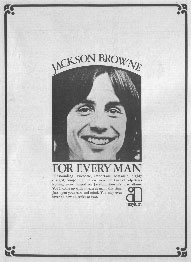![]()
  |

For Everyman
Jackson Browne
Asylum 5067
Released: November 1973
Chart Peak: #43
Certified Platinum: 5/16/89
 The title track of Jackson Browne's second album, "For Everyman," was a response to the escapist vision of Crosby, Stills and Nash's "Wooden Ships." As violence, fear and paranoia overtook Sixties utopianism, "Wooden Ships" (written by Crosby and Stills, along with Paul Kanter of the Jefferson Airplane) imagined a kind of hipster exodus by sea from a straight world teetering on the edge of apocalypse. "We are leaving/You don't need us," the song declared.
The title track of Jackson Browne's second album, "For Everyman," was a response to the escapist vision of Crosby, Stills and Nash's "Wooden Ships." As violence, fear and paranoia overtook Sixties utopianism, "Wooden Ships" (written by Crosby and Stills, along with Paul Kanter of the Jefferson Airplane) imagined a kind of hipster exodus by sea from a straight world teetering on the edge of apocalypse. "We are leaving/You don't need us," the song declared.
Browne wasn't giving up so easily. As David Lindley's guitar eases the introspective "Sing My Songs to Me" seamlessly into "For Everyman," Browne sings in his characteristic long, fluid lines: "Everybody I talk to is ready to leave with the light of the morning/They've seen the end coming down long enough to believe that they've heard their last warning.../But all my fine dreams, well-thought-out schemes to gain the motherland/Have all eventually come down to waiting for Everyman." Deliverance must come for everyone, Browne insisted, not just hippie troubadours.
 Click image for larger view. |
Browne is still searching for his true voice on For Everyman. Is he the genial rogue of "Red Neck Friend" or th emystical dreamer of "Our Lady of the Well"? He will find that voice the following year on his masterpiece, Late for the Sky. But on For Everyman, he was testing his various talents with obvious joy, because, like his audience, he was just discovering them.
- Anthony DeCurtis, Rolling Stone, 8/5/99.
Jackson Browne is a highly respected songwriter, and has been for some time -- one of many, to be sure, who owe a lot to Tom Rush, but one of such skill he would have made it anyway. This is only his second album, and it is a gentle, unspectacular one, perhaps a bit too quiet and civilized sometimes, but crammed with more quality material that you could reasonably expect. Vocally, Browne is an all-right interpreter but doesn't go out of his way -- what Martin Mull calls that extra mile -- to reach you. His singing isn't bad at all, but I don't find it particularly interesting. I keep imagining Tom Rush or Bonnie Raitt or somebody hitched up to each song, and Bonnie does sing a little dab of harmony in "The Times You've Come." Other celebrity guests appear, too; David Crosby sings harmony for a minute or two, Joni Mitchell plays a few piano chords, and no less a figure than Rockaday Johnnie (come on, now, you remember "Turned on my radio/ It was Rockaday Johnnie singin'/ Tell your ma, tell your pa/ Our love's gonna grow, ooh-wah, ooh-wah") tickles the ivories in "Red Neck Friend." Browne's singing of his "old" favorite "These Days," indeed the whole arrangement of it, seems forced and self-conscious, perhaps because too many good arrangements already exist and he was trying to avoid me-tooism, or perhaps because he listened to the wrong advice; it says here the arrangement was "inspired" by Gregg Allman. Generally, the vocals aren't bad, though, and the arrangements are nice and clean. The songs are all good, solid; they don't hit you in the face but hang around the edges of memory for a long time. Most memories can use something this nice hanging around the edges.
- Noel Coppage, Stereo Review, 4/74.
Though this is only his second solo LP, Browne has long been a top writer, and his soft vocals and sensitive guitar and piano lend well to "Colors of the Sun" and "These Days," while he rocks through "Redneck Friend." Laid back but not laid down; fine arrangements.
- Billboard, 1973.
The singer-songwriter folks are lining up behind this one as album of the year, but although I'm intrigued by Janet Maslin's suggestion that Browne fuses New York and California sensibilities, sometimes I'm afraid all she means is that he can read. Even as he lists toward the pretentious and the vague, the reflective evenness of Browne's delivery sets up an expectation of cogency that on this album is satisfied only by such relatively unambitious songs as "These Days," "Red Neck Friend," and the charming "Ready or Not." Which save it for me. B
- Robert Christgau, Christgau's Record Guide, 1981.
Jackson Browne was a premiere member of the early seventies singer/songwriter school -- in his case, the emphasis is on the songwriter side. For Everyman includes some fine examples of his lyrical skills: "These Days," "Redneck Friend," "Ready or Not," and the title cut being the most notable examples. As usual, he is backed with sympathetic arrangments, but the CD's sound is nothing special; it's murky, with limited dynamic enhancement and some tape hiss. B-
- Bill Shapiro, Rock & Roll Review: A Guide to Good Rock on CD, 1991.
Jackson Browne faced the nearly insurmountable task of following a masterpiece in making his second album. Having cherry-picked years of songwriting the first time around, he turned to some of his secondary older material, which was still better than most people's best and, ironically, more accessible -- notably such songs as "These Days," which had been covered six times already, dating back to Nico's Chelsea Girl album in 1967, and "Take It Easy," a co-composition with the Eagles' Glenn Frey, which had been a Top 40 hit for the group in 1972. Brown unsuccessfully looked for another hit single with the uptempto "Red Neck Friend," reminisced about meeting his wife and starting a family in the coy "Ready or Not," and, at the end, finally came up with a new song to rank with those on the first album in the philosophical title track, which reportedly was his more positive reply to Crosby, Stills, Nash & Young's "Wooden Ships." (David Crosby sang harmony). Musically, the album was still restrained, but not as austere as Jackson Browne, as the singer had hooked up with multi-instrumentalist David Lindley, who would introduce interesting textures to his music on a variety of stringed instruments for the next several years. All of which is to say that For Everyman was a less consistent collection than Browne's debut album. But Browne's songwriting ability remained impressive. * * * *
- William Ruhlmann, The All-Music Guide to Rock, 1995.
Jackson Browne emerged as the J.D. Salinger of the California singer-songwriter scene with his second album, capturing the transition from the idealistic Sixties to the disillusioned Seventies. He sings a moving update of "These Days," a song he originally wrote as a teenager for Velvet Underground singer Nico.
For Everyman was chosen as the 457th greatest album of all time by the editors of Rolling Stone magazine in Dec. 2003.
- Rolling Stone, 12/11/03.
![]() Reader's Comments
Reader's Comments
No comments so far, be the first to comment.